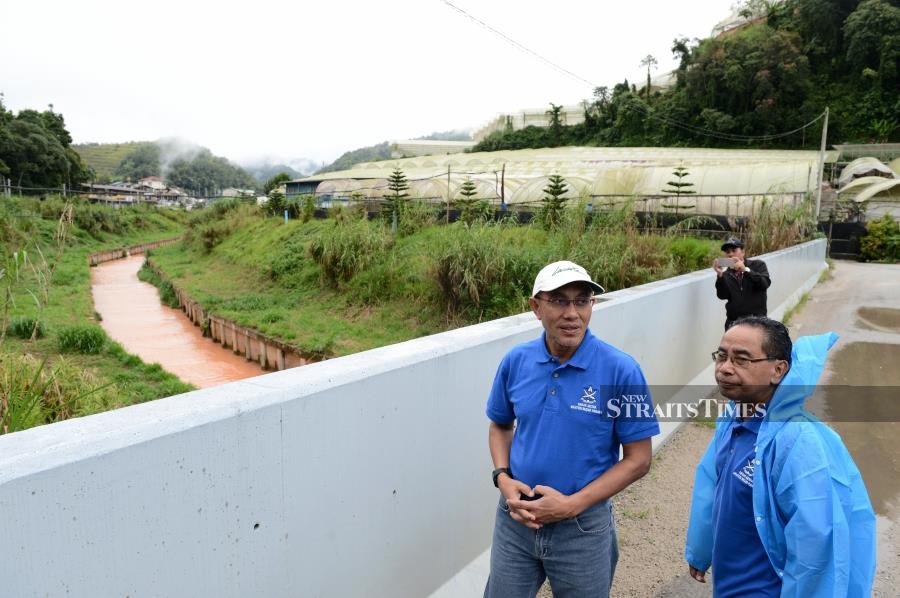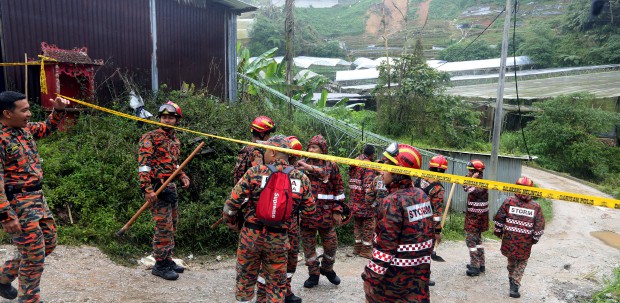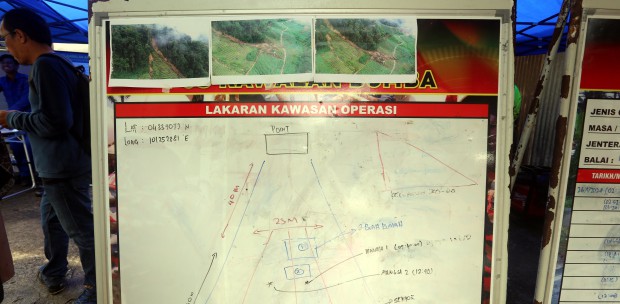KUANTAN: Next month will be D-Day for farmers to vacate their illegal farms in Cameron Highlands as the Pahang government prepares to embark on its 'Op Lestari' enforcement operations.
In January this year, 172 notices were issued to farmers operating in ecologically-sensitive areas in the highlands' Bertam Valley, such as river reserve and road reserve land. The final eviction notices were issued to them on Aug 27.
Among those served eviction notices are about 100 farmers who were granted temporary occupational licences (TOL).
According to Pahang state secretary Datuk Seri Dr Sallehuddin Ishak, since last year, the state government has stopped approving and renewing TOL.
The enforcement action under Op Lestari was supposed to have started in March this year but was postponed due to the Movement Control Order.
Op Lestari is aimed at "cleansing" 35,000 hectares of land in the Bertam Valley illegally occupied by farmers, including 12 hectares of road reserve land and 23 hectares of river reserve land starting from the Lembah Bertam fire station to Mansion Goat Cottage.
Sallehuddin told Bernama the farmers concerned have been given ample time to vacate the land as the enforcement activity was supposed to have started in March.
"The decision not to renew their TOL was not popular but it is an effective one. The TOL land will all be handed over to the Cameron Highlands Development Corporation which will get rid of all agricultural activities in sensitive areas such as river and road reserves.
"Those farmers who really want to carry out agricultural activities will be offered land that is suitable for farming," he said.
The Cameron Highlands Development Corporation was established by the state government in November last year to ensure sustainable development in the highlands.
Sallehuddin said the state government is also proposing to create an agricultural zone in Cameron Highlands to enable agricultural activities to be carried out in areas that pose fewer risks for the environment. It will also facilitate proper monitoring and enforcement activities.
"We need to monitor them properly because in the past, we have had farmers with TOL who extended their farms beyond the area allocated to them," he added.
HILL SLOPES, WATER QUALITY
For years, illegal land-clearing and farming activities have been blamed for the landslides, mudslides and floods that frequently occur in Cameron Highlands.
In November 2014, a mud flood that swept through Ringlet town and Bertam Valley claimed three lives. In January 2017, a Bangladeshi worker was buried alive after a landslide struck Kuala Terla following a heavy downpour.
In October 2018, three Myanmar nationals were killed after their workers' quarters in Kuala Terla were destroyed in a landslide.
Commenting on these tragedies, Sallehuddin said the state government is determined to put a stop to all illegal activities stationed in ecologically-sensitive areas, including class III and IV hillslopes with gradients exceeding 25 degrees and 35 degrees
respectively.
And, following last year's pollution incident in Sungai Ichat in Cameron Highlands, the state government is implementing stricter measures to protect the highlands' rivers, especially Sungai Bertam which is among the main sources of raw water supply in Pahang.
"The conservation of Sungai Bertam is more critical because it is not only a source of water for Cameron Highlands folks but for many others in the state," said Sallehuddin.
Besides the Habu water treatment plant (WTP) in Cameron Highlands, Sungai Bertam also supplies raw water to 17 WTPs located throughout the stretch of Sungai Pahang, starting from Terla to Pekan district and involving 122,049 water account holders.
"If Sungai Bertam becomes polluted, it will affect a lot of people," he added.
Based on the data collected by 11 water quality monitoring stations located in various spots along Sungai Bertam, Sallehuddin said three of the stations recorded readings indicating class III water quality, which means that intensive treatment is required to cleanse the water.
One station revealed readings that require conventional treatment for the water while the readings provided by four other stations showed the water was fit for recreational use. And, according to the readings from another three stations, the water was still in its natural state.
DANGER OF PESTICIDES
In Cameron Highlands, uncontrolled land-clearing and farming activities in areas located near riverbanks have always placed rivers at risk of pollution.
Heavy rain would often result in high turbidity levels in rivers and when the turbidity exceeds 1,000 NTU (nephelometric turbidity units), the WTP has to be shut down as the water cannot be treated, resulting in disruptions in water supply to consumers.
"The state government is responsible for protecting the interests and welfare of the residents in the state who obviously outnumber the individuals who derive an income from agricultural activities that are carried out in an uncontrolled manner," said Sallehuddin.
He said illegal flower farms in Cameron Highlands were more worrying as they may be using higher quantities of poisonous pesticides and fertilisers, the residues of which may permeate into the ground and flow into the water resources when it rains.
"This is why the state government has proposed to create an agricultural zone in Cameron Highlands which will make it easier for us to monitor the impact of their cultivations," he said.
He said intrusions into road reserves must also be brought to a halt as they can cause damage to the roads; the road reserves, furthermore, are gazetted for use for emergency purposes. Illegal agricultural activities on hillslopes are even more dangerous as they can cause landslides to occur, he added.
To protect the river reserve land, the state government has agreed to declare those areas as forest reserves and collaborate with the Forest Research Institute of Malaysia to identify jungle species that can be planted there. The state government will also work together with the National Hydraulic Research Institute of Malaysia to beef up its river reserve conservation plans.
"We will also use the latest technology, including drones and satellites, to ensure there is no more illegal exploitation of land in Cameron Highlands," he said.
The state government is also working closely with the Malaysian Space Agency to get the latest reports on Bertam Valley which came under the agency's radar several weeks ago, he added.
-- Bernama





